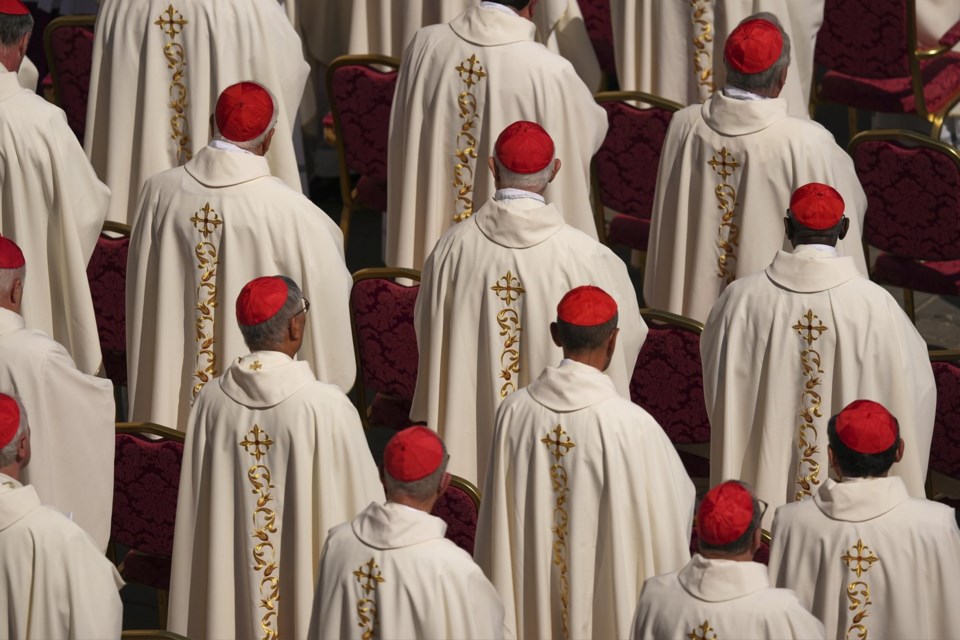TORONTO — The 132 cardinals tasked with selecting the next pope are all in Rome, with the conclave set to begin on Wednesday. Here's what you need to know about the papal election:
WHAT'S A CONCLAVE?
The conclave is the secret, ceremonial process by which cardinals select the new head of the Roman Catholic Church. Each of the cardinal electors cast a ballot for their pick, with successive rounds of voting until one candidate receives a two-thirds majority of the vote and becomes pope.
WHAT HAPPENS DURING A CONCLAVE?
Cardinals participating in the conclave must take a vow of secrecy, barring them from discussing the particulars of each election. However, the conclave process is a rich tradition dating back centuries.
Cardinals gather in the Sistine Chapel to cast their ballots. There is one vote on the first day, and two rounds of voting in the morning and two in the afternoon on subsequent days.
Once the vote has been counted, the ballots are burned. If no pope has been chosen, chemicals are added to the fire that makes the smoke burn black. If the cardinals have elected a pope, the smoke is made to burn white.
HOW LONG DOES IT TAKE?
There's no real time limit on a conclave. The Vatican says the longest papal election came just before the conclave process was established. It took three years for Pope Gregory X to be named pontiff in 1271. At that time, cardinals were not sequestered like they are now.
Gregory X formalized the process by which cardinals are secluded in an effort to prevent such long elections going forward.
The Vatican says the shortest conclave lasted only a few hours in 1503.
Pope Francis's election wrapped up in two days, after five rounds of voting.
WHO'S ELIGIBLE TO BECOME POPE?
Technically, any baptized Catholic man can be elected pope, but for the last 650-ish years the electorate has chosen a cardinal for the role.
WHO CAN VOTE?
Only cardinals under the age of 80 can vote for pope. Of the 252 cardinals, 135 meet that threshold, but only 132 will participate in the conclave. The Vatican says two eligible cardinals aren't travelling to Rome because of poor health — and it's not the sort of thing you can do remotely. A third won't participate because he was convicted a year and a half ago of embezzlement and fraud.
WHAT ABOUT THE CANADIAN CARDINALS?
Canada has five cardinals, but only four of them can vote in the conclave. Cardinal Marc Ouellet, who was considered a front-runner for the papacy 12 years ago, turned 80 last year.
That doesn't rule him out for pope, but he's not able to participate in the conclave.
Cardinal Gerald Lacroix, 67, took over from Ouellet as Archbishop of Quebec in 2011 and was made a cardinal in 2014. Pope Francis appointed him to his nine-member Council of Cardinals in 2023 to serve as an adviser to the pope.
Both Ouellet and Lacroix are considered long shots for the papacy because they were named in a 2022 class-action lawsuit alleging sexual misconduct, with the allegation against Lacroix being added to the suit in 2024. Both have denied the allegations. The Vatican said there were no grounds to investigate Ouellet, and a Church-led investigation into the allegation against Lacroix found it was not substantiated. The claims have not been tested in court, and the lawsuit is ongoing.
Cardinal Thomas Collins, the former Archbishop of Toronto, is the only Canadian elector who has participated in a conclave before. The 78-year-old was elevated to the College of Cardinals in 2012, so he participated in the conclave that chose Francis.
Cardinal Francis Leo, who goes by Frank, is the newest and youngest Canadian cardinal. He became a cardinal just six months ago and is 53 years old. There are only five cardinals younger than him. He took over from Collins as Archbishop of Toronto in 2023.
Cardinal Michael Czerny, also 78, had worked at the Vatican for years before Francis made him a cardinal in 2019. He serves as Prefect of the Dicastery for Promoting Integral Human Development in Vatican City, charged with defending migrants and issues around the environment.
This report by The Canadian Press was first published May 6, 2025.
Nicole Thompson, The Canadian Press




